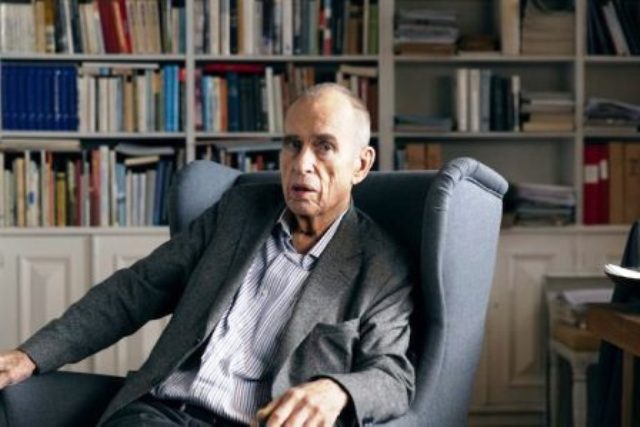


John Webster: Donner – Private

I am hooked from the very first moment. Director John Webster puts a pillow behind the back of Jörn Donner (1933-2020) as the start of the last interview Donner did. He sits in an armchair, it’s December 2019, he has a tumor in his lungs, nothing can be done about it, he dies end of January 2020. He is visibly in pain but not more than he is able to talk to Webster behind the camera in sharp and precise sentences, interesting from start till end. There is never a dull moment in this documentary where Pirjo Honkasalo contributed with a script and the planning of this last interview…
From the armchair to a quickly edited prologue with clips and photos from the life of Jörn Donner – a writer, film director, film producer, film critic, journalist, politician, business man, and photographer. The latter forms the film as it turns out that Donner has taken photos his whole life, in Finland and round the world that he visited from, when he was quite young. Good photos also of his children, there are six of them. Two from his first marriage, two from his last and two extra-marriage children.
The film switches from the photos to clips from his films accompanied by sound interviews with some of the children and with lovely Harriet Andersson (born 1932) – Donner took some fantastic photos of her, who talks so wonderful about him and their year-long love relationship.
Back to the armchair and the beginning of the film. The prologue is accompanied by a song, “Mr. Wonderful” from Donner’s film “69”, and right after that Donner talks about his creative life referring to himself as “the 95er”, who never committed himself totally to film or anything, but was closest to writing as he says later in the interview. “My life was phenomenal and yet a long-running failure”! A son from the last marriage characterizes his life as a performance, where he plays an arrogant, self-centrered male but also a loveable father. And we see home videos of Donner as the father with the two youngest, on a fishing tour, putting presents on a tree, in the swimming pool and on the football pitch. And building a house in the countryside for the children and his wife, 23 years younger than him. Johan Donner, his oldest son (I remember having seen a film of him at the Tampere FF way back, “En stad under huden” 1982) has quite different memories of his father, who did not want to accept him. In the interview Donner talks about his constant being away, he was 22 when Johan was born. He cut the connection to the two first children and their mother to realise his own ambitions as an artist. In archive clips Donner talks about himself, “I am an exhibitionist”; others characterise him as always being sarchastic. This is actually how I remember him the few times I heard him talk in Nordic film events, super-charismatic, provocative, a man who wants to be remembered as “swimming against the current”, as he says, a “nonconformist”. One of the sons comment on this: Yes, but the older he became, the more he became part of the establishment. That’s how it is, isn’t it?
Jörn Donner, a globetrotter, a womaniser… talks in this last interview about how he still every day wants to plant a little flower – write something, “produce letters” as “writing is a cure to illness”, “I am a wordsmith”. And gosh how many books he ended up leaving us readers. Novels but also a handful of books on Ingmar Bergman. Yes, there he sat in the armchair answering questions, reflecting on his own life, talking beautifully on loneliness and friendships, “I did not have many”, and on how he was happy to be alone in periods… a fascinating film… an intellectual beacon in a frank conversation. But, he says, “the innermost memories I keep for myself”.
Finland, 2021, 78 mins.